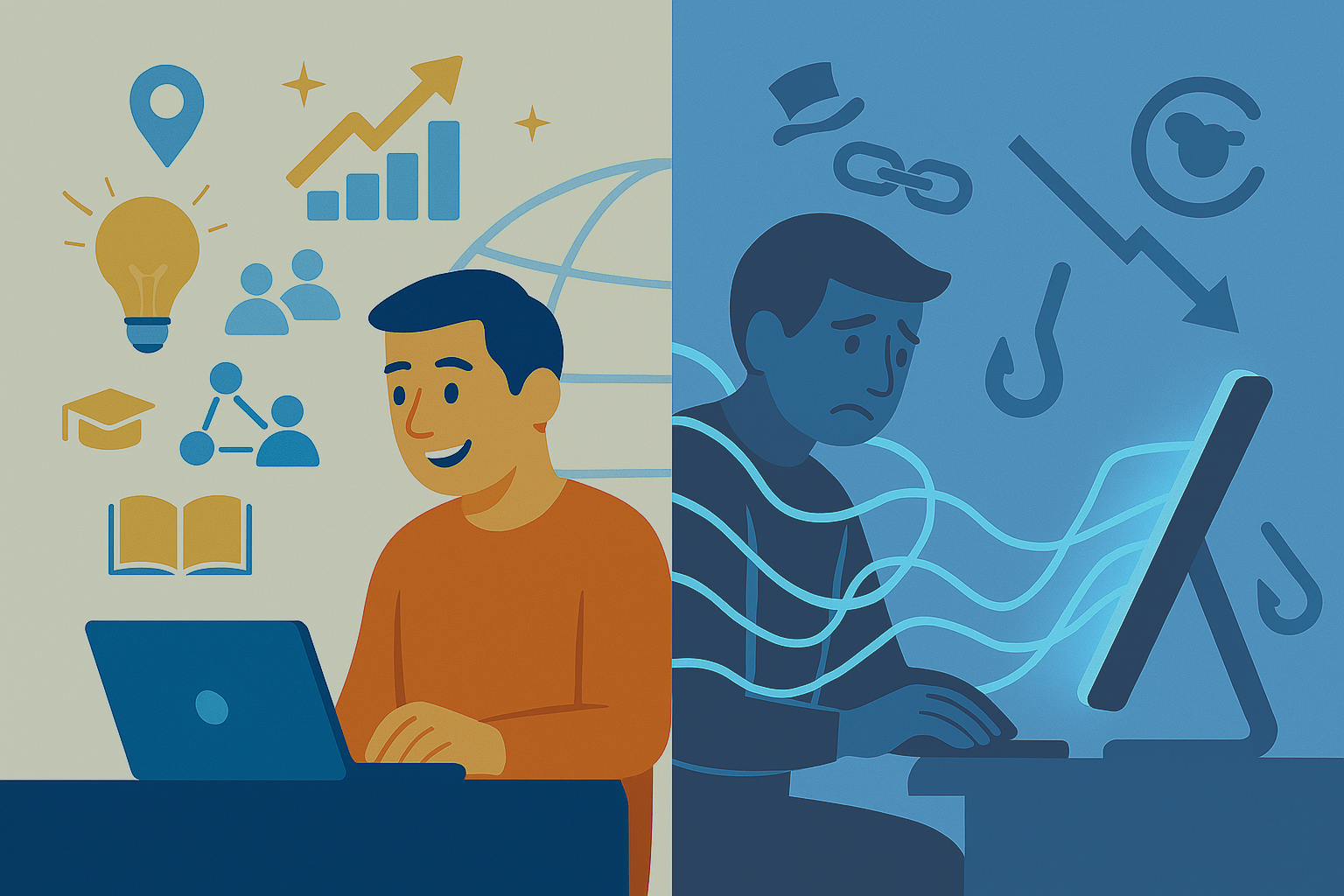Trends in World Economies in the On-line Era

I. Introduction: The Planet's New Nervous System
Just thirty years ago, the global economy resembled a world map with a few large, dominant city-centers: New York, London, Tokyo. Capital and information moved between them, shaping global processes. Today, that map looks more like an image of the brain's neural network—a decentralized, instantly responsive, constantly changing structure where an idea born in one corner of the planet can span the globe in hours.
We have entered the on-line era. This is not just about 'e-commerce' or 'remote work.' It is a fundamental shift from an economy of place to an economy of flows—flows of data, capital, talent, and ideas. This shift has created unprecedented opportunities for growth and efficiency. However, like any powerful tool, it has generated systemic risks that we are only beginning to comprehend.
In this article, we will first examine three key achievements of the online economy, and then analyze three systemic risks hidden behind this facade of prosperity.
II. The Bright Side: Three Engines of Global Prosperity
1. Democratization of Access
The on-line era has broken down age-old barriers. Geography, starting capital, and access to information are no longer insurmountable obstacles.
- For Entrepreneurs: A small-town workshop can now sell its products worldwide via Etsy. A freelancer from any country can work for a global corporation through Upwork, competing on skills, not location.
- For Consumers: Residents of remote areas have gained access to goods, services, and education that were once the privilege of megacities. Online courses from top universities, global marketplaces, and streaming services have leveled the playing field.
- For Investors: Crowdinvesting platforms allow small investors to fund startups they believe in, democratizing access to capital.
2. Radical Efficiency
Algorithms and big data have enabled the optimization of economic processes to a level previously unattainable by the human mind.
- Logistics: Companies like Amazon can predict demand and deliver goods within a day thanks to predictive analytics and fully automated warehouses.
- Resource Utilization: Dynamic pricing allows airlines to fill planes to capacity and taxi services to efficiently dispatch cars, reducing empty mileage.
- Manufacturing: 'Smart' factories (Industry 4.0) use digital twins and sensors to minimize defects, reduce waste, and save energy.
3. The Knowledge and Talent Economy
The main form of capital is no longer physical assets (factories, machinery) but intellectual assets—knowledge, creativity, and skills.
- Global Labor Market: Companies can hire the best specialists from around the world, creating truly international teams to solve complex problems.
- New Professions: Entire industries have emerged around the creation of digital content—from developers and data analysts to bloggers and virtual world creators.
- Accelerated Innovation: Global scientific collaborations, platforms like GitHub, and the open-source movement enable humanity to solve problems with unprecedented speed.
III. The Shadow Side: Three Systemic Risks for Civilization
1. The Risk of Digital Inequality (The Shadow of Democratization)
Instead of leveling the playing field for all, the online economy has created a new, deeper divide—between those who control the platforms and those who depend on them.
- Monopolization: A few tech giants control key infrastructure—search, social media, cloud computing—dictating the rules of the game for millions of businesses and billions of users.
- "Winner-Take-All" Dynamics: On each platform, one dominant player eventually emerges, capturing almost all the profit and leaving only crumbs for the rest.
- The Digital Divide: People without access to high-speed internet or modern digital skills are completely excluded from the new economy, exacerbating existing inequalities.
2. The Risk of Algorithmic Dictatorship (The Shadow of Efficiency)
When efficiency, measured in clicks, views, or profit, becomes the sole objective, algorithms begin to make decisions that are unethical and harmful to individuals and society.
- Exploitation of Attention: Social media feeds are optimized not to inform or enlighten, but to retain the user at any cost. This is achieved through content that evokes strong emotions (anger, fear), which inevitably leads to social polarization, the spread of disinformation, and digital addiction.
- Dehumanization of Labor: Gig economy workers are managed by a soulless algorithm that tracks their every move, penalizes them for the slightest deviation, and disregards human factors. The person becomes an appendage to the app.
- Embedded Bias: Algorithms trained on historical data reproduce and amplify existing societal prejudices, which can lead to discrimination in hiring, credit scoring, and even law enforcement.
3. The Risk of Social Atomization (The Shadow of the Talent Economy)
Flexibility and global competition are eroding the stable social structures that have supported individuals for centuries.
- Erosion of Social Guarantees: Freelancers and gig economy workers, who make up a growing portion of the workforce, are deprived of pensions, sick leave, paid vacations, and union protection.
- Loss of a Sense of Belonging: Working in constantly changing remote teams on short-term projects does not create the strong social bonds and sense of community that were formed in traditional workplaces. This leads to an increase in professional loneliness.
- "Race to the Bottom": Global competition on freelance platforms often leads to lower rates and the devaluation of skilled labor, as there is always someone willing to work for less.
IV. Conclusion: From a "Smart" Economy to a Wise Civilization
The online economy has given us incredibly powerful tools for organizing collective action. The problem is that we are using these 21st-century tools with 20th-century goals and values—maximum efficiency and profit extraction at any cost. We have built a very "smart" system that has turned out to be not very wise.
The philosophy of Civethica proposes to "update the operating system"—to embed new, higher goals into our digital and economic tools: systemic health, sustainability, and human dignity.
The task of our generation is not to stop digitalization, but to direct its power. To move from creating "smart" technologies to creating wise systems that will make us not only richer, but also more human.
